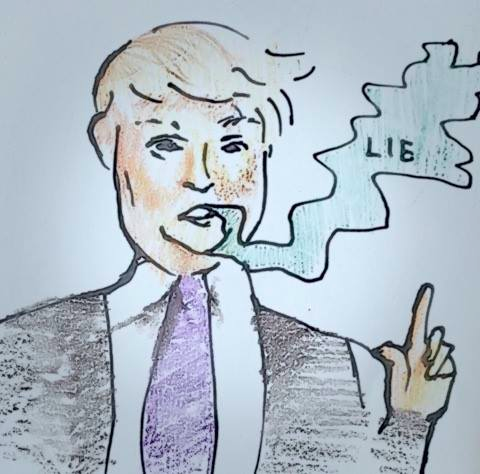Donald Trump: Truth or Fiction

Art credits to Hannah Usadi!
April 7, 2017
Donald Trump. A name synonymous with controversy. Throughout the 2016 election cycle and the first few months of his presidency, Trump has come under fire for the frequency of his controversial and misleading statements as well as for his subsequent attacks on his fact-checkers. Increasingly, Donald Trump’s credibility is becoming a prominent issue in American politics.
Lying is by no means a new phenomenon in the White House. Various former presidents have lied in order to conceal scandals. Take, for instance, the infamous Watergate Scandal in which President Richard Nixon refused to reveal tapes of his conversations, provided thousands of dollars to quiet the situation, and instructed the CIA to obstruct the FBI’s investigation of the scandal. Due to his untruthfulness and abuse of power, Nixon resigned from his presidency [1].
While Trump’s dishonesty does not extend as far as Nixon’s, his misstatements far outnumber those of other presidents. For instance, according to Politifact, only 115 out of 377 of President Trump’s statements were “somewhat true,” while 446 out of former President Obama’s 596 statements were “somewhat true” [2, 3].
At the beginning of March, President Trump found himself embroiled in a scandal following his accusation that then-President Obama wiretapped Trump Tower during the 2016 election. The President posted the claim on Twitter, tweeting, “How low has President Obama gone to tap my phones during the very sacred election process. This is Nixon/Watergate. Bad (or sick) guy!” and “Terrible! Just found out that Obama had my ‘wires tapped’ in Trump Tower just before the victory. Nothing found. This is McCarthyism!” [4]. A series of factual inaccuracies and misrepresentations would soon follow.
While President Trump confidently presented his claim on Twitter, White House Spokesman Sean Spicer struggled to present evidence. In order to clarify President Trump’s tweets, Spicer explained, “The president used the word wiretap in quotes to mean ‘broadly surveillance’” [5]. However, this re-characterization of President Trump’s tweet only further called into question the accuracy and evidence behind Trump’s claim. Following this clarification, Spicer implicated GCHQ, the British intelligence agency, in President Trump’s allegation.
According to CNN, “Officials in London were livid that White House spokesman Sean Spicer cited an unsubstantiated report that Britain’s Government Communications Headquarters—the British equivalent of the NSA—had been used by Obama in the operation” [6].
Finally, President Trump’s accusation was dismissed by FBI Director James Comey who stated, “With respect to the president’s tweets about alleged wiretapping directed at him by the prior administration, I have no information that supports those tweets and we have looked carefully inside the FBI… the answer is the same for the Department of Justice and all its components” [5].
This month-long scandal has revealed not only the factual inaccuracies that are commonplace in the Trump administration, but also the need for accountability within the administration. Accusing a former president of criminal action is an enormous allegation to make, and, based upon Comey’s responses, President Trump’s claims appear unsubstantiated and unsupported.
So, in the future, who can hold President Trump accountable for his lies or even his mere inaccuracies? As the FBI and Department of Justice cannot regularly fact-check the president, it is often the media’s responsibility to verify Donald Trump’s statement.
While various news organizations and fact checking sources have attempted to hold President Trump accountable for his lies, these organizations have issues asserting their credibility, particularly when he claims that these organizations are “fake news.”
Nastassja Kuznetsova ‘19 voices her concerns regarding fact-checking Donald Trump: “I think that there should be an organization other than the media monitoring the factual accuracy of the president. However, even if we were to implement this, I don’t see it having much effect.”
President Trump often complains that the media misconstrues his statements into lies due to its liberal-leaning bias. In doing so, President Trump undermines the authority of the media to verify his statements, essentially presenting himself as the only authoritatively accurate source for news. Anup Dupaguntla ‘17 further reiterates this point, stating that “anyone with any awareness of world news should be able to see that Trump constantly lies about empirical, verifiable facts. But the media can’t do anything even when they expose him since many people only receive news from Trump himself.”
Herein lies the real issue with President Trump’s dishonesty. Donald Trump is the forty-fifth President of the United States and, as the leader of this country, he is the representative of not merely his own supporters, but also of every citizen of this nation. Especially after a divisive election, Donald Trump should work to stabilize the nation by uniting all American citizens through increased government transparency.
However, by discrediting all of his opposition, Donald Trump aggravates the already existing division between his supporters and his critics. If President Trump’s skeptics are not certain of the true meaning behind his statements, how can they unite behind the president? If there is no one to hold Donald Trump accountable, then how can the people judge whether his actions are in the best interests of the nation? Just as Nixon’s Watergate Scandal escalated public skepticism of the office of president, Donald Trump’s lies and dishonesty may divide America for years to come.
[1] http://www.history.com/topics/watergate
[2] http://www.politifact.com/personalities/barack-obama/
[3] http://www.politifact.com/personalities/donald-trump/
[6] http://www.cnn.com/2017/03/19/politics/house-intelligence-committee-hearing-russia-wiretapping/
